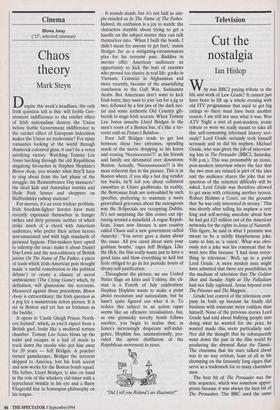Cinema
Blown Away
('15', selected cinemas)
Chaos theory
Mark Steyn
Despite this week's headlines, the only Irish question left is this: will feeble Gov- ernment indifference to the ratchet effect of Irish nationalism destroy the Union before feeble Government indifference to the ratchet effect of European federalism makes the Union an irrelevance? For misty romantics looking at the world through shamrock-coloured glass, it can't be a veryu satisfying victory. Watching Tommy Lee Jones lurching through the old Republican singalong favourites in Stephen Hopkins's Blown Away, you wonder what they'll have to sing about from the last phase of the struggle: the Remembrance Day massacre? the dead kids and Australian tourists and Hyde Park horses and shoppers on Staffordshire railway stations?
For movies, it's an even trickier problem. Irish freedom-fighter heroics have most recently expressed themselves in hunger strikes and dirty protests, neither of which strike much of a chord with American audiences, who prefer their action heroes non-emaciated and with high standards of personal hygiene. Film-makers have opted to sidestep the issue: make it about Daniel Day-Lewis and the non-existence of British justice (In The Name of The Father, a piece of trash which Irish-American pols thought made 'a useful contribution to the political debate') or create a climate of moral ambivalence (The Crying Game) which, by definition, will glamourise the terrorists. Measured against those precedents, Blown Away is extraordinary: the Irish question as a peg for a mainstream action picture. It is set in Boston and yet has an Irishman as the baddie.
It opens in 'Castle Gleigh Prison, North- ern Ireland', which, as you'd expect from a British gaol, looks like a medieval torture chamber. Tommy Lee Jones blows up the toilet and escapes in a hail of stools to track down the stoolie who put him away for 20 years — Jeff Bridges. A poacher turned gamekeeper, Bridges the terrorist skipped to America, lost his Irish accent and now works for the Boston bomb squad. His father, Lloyd Bridges, is also on hand in the role of the whiskery old-timer with a leprechaun twinkle in his eye and a Barry Fitzgerald line in homespun philosophy on his tongue. It sounds dumb, but it's not half as sim- ple-minded as In The Name of The Father. Indeed, its confusion is a joy to watch: the characters stumble about trying to get a handle on the subject matter they can talk themselves into. 'When I built the bomb, I didn't mean for anyone to get hurt,' insists Bridges Jnr as a mitigating-circumstances plea for his terrorist past. Baddies in movies offer American audiences an opportunity to kick the butt of enemies who proved too elusive in real life: gooks in Vietnam, Commies in Afghanistan and more recently, because of the unsatisfying conclusion to the Gulf War, Saddamite Arabs. But Americans don't want to kick Irish butts; they want to join 'em for a jig or two, followed by a few jars of the dark nec- tar and some authentic Old Country gib- berish in stage-Irish accents. When Tommy Lee Jones assaults Lloyd Bridges in the men's room of a Boston bar, it's like a ter- rorist raid on Finian's Rainbow.
Poor Jeff Bridges tends to get lost between these two extremes, spending much of the movie dropping to his knees and roaring `N000000000!!!' as his friends and family are detonated over downtown Boston. Actually, `N0000000000!!! is the most coherent line in the picture. This is in Boston where, if you slip a hot dog vendor ten bucks, he'll tell you about collateral casualties at Ulster gaolbreaks. In reality, the Bostonian Irish are untroubled by such specifics, preferring to maintain a more generalised grievance about the outrageous way the B-Specials are occupying Dublin. It's not surprising the film comes out tip- toeing around a minefield. A rogue Repub- lican, Jones now favours 'a new, country called Chaos and a new government called Anarchy'. 'You never gave a damn about the cause. All you cared about were your goddam bombs,' rages Jeff Bridges. Like the IRA, the film really wants just to have a good time and blow everything to hell but feels obliged to go in for periodic bouts of dreary self-justification.
Throughout the picture, we see United States flags on kites and T-shirts; the cli- max is a Fourth of July celebration: Stephen Hopkins wants to make a point about revolution and nationalism, but he hasn't quite figured out what it is. To reduce this subject to an action caper seems like an offensive trivialisation, but, as one gimmicky novelty bomb follows another, you begin to realise that, in Jones's increasingly desperate self-indul- gence, Hopkins has, unintentionally, pro- vided the aptest distillation of the Republican movement in years.
"Did I tell you Roland's an illusionist?"


























































 Previous page
Previous page